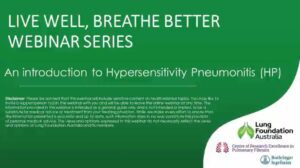In this video, Dr Hayley Barnes and consumer advocate, Ted Moore provide an overview of Hypersensitivity Pneumonitis and an insight into how to navigate the diagnosis and management of your condition.
Hypersensitivity Pneumonitis (HP) is a lung condition caused by an immune response to inhaled allergens, leading to lung inflammation. There are a range of types of inhaled materials that can cause HP in the lungs, most of which are naturally occurring and organic. Common allergens can include mould, bird feathers and droppings, compost and garden mulch, bacteria in contaminated water, and grains and other farming materials, bacteria or moulds from woodwind and brass musical instruments. It is also thought that risk factors can include genetics, family history, smoking and vaping. Hypersensitivity Pneumonitis is relatively rare compared to other lung conditions like asthma and COPD.
Some people with certain jobs or who live in certain environments may be at greater risk of HP. Symptoms of Hypersensitivity Pneumonitis can vary and may include fever, dry cough, breathlessness, wheezing, fatigue, and weight loss. These symptoms can last from a few days to years and may improve when a person is away from the allergen.
Diagnosis involves a detailed history of the patient’s environment, physical exams, and tests such as chest X-rays, CT scans, lung function tests, and blood tests. In some cases, bronchoscopy or lung biopsy may be necessary.
Treatment focuses on avoiding the allergen to prevent further lung inflammation. Medications like anti-inflammatory drugs (e.g., prednisone) and anti-fibrotic drugs (e.g., nintedanib) may be used. Quitting smoking, vaccinations, pulmonary rehabilitation, and oxygen therapy are also recommended.
Prognosis of Hypersensitivity Pneumonitis varies. Avoiding allergens can reverse lung inflammation in some cases, but fibrotic HP, which involves permanent lung scarring, may worsen even with treatment. It is important to discuss your individual circumstances with your healthcare professional.
Was this page helpful?
Good job! Please give your positive feedback
How could we improve this post? Please Help us.
